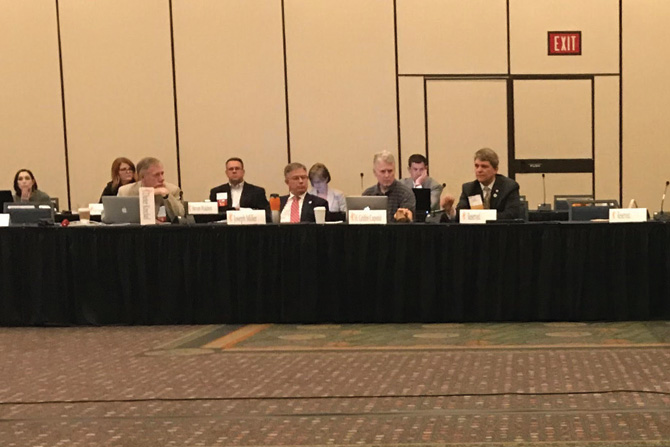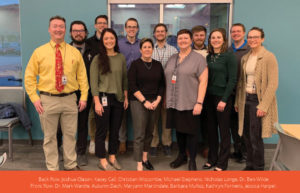Sarah Woolsey, M.D., MPH, FAAFP
The American Academy of Family Physicians (AAFP) is a member-driven organization and does amazing work on our behalf. AAFP Commissions are one of the organization’s most effective structures used to ensure member input is considered on critical topics. Commissions are nationally representative bodies of members and Chapter Executives that give feedback to the AAFP on all sorts of areas. They assist with the development of programming, assist with policy adaptation, help ensure the Academy appropriately acts on Resolutions, and help decide if specific programs should be discontinued. Members apply and are chosen to participate for a four-year term. During their term, members travel to Kansas City, Missouri, for two in-person sessions each year and have web-based documents to review and edit, comment on, and vote to approve throughout the year. The in-person sessions provide added learning and current topics, opportunities to network with members from across the U.S., and “breaking” policy updates from AAFP Leadership.
AAFP Commissions include:
- Continuing Professional Development
- Membership and Member Services
- Education
- Health of the Public and Science
- Finance and Insurance
- Quality and Practice
- Governmental Advocacy
I was chosen to participate in the commission on Quality and Practice in December 2018 and just finished a year and a half of attendance and participation. The COVID-19 pandemic has caused the cancellation of the planned May in-person session, replaced by an online event instead. Additionally, the AAFP has required rapid and front-line feedback from us this month to produce advocacy position papers, and advocate for funding for testing, access to Personal Protective Equipment, and financial protection from the crisis. We have been “on-call” for quick reviews and to help craft the content that comes from the AAFP to Washington and to CMS and the CDC. More than ever, I value my role in shaping the AAFP’s message to truly impact the course of current events.
In the usual course of a commission year, I will participate in the two weekend meetings (leaving Friday afternoon to start early Saturday meetings, then home by dinner Sunday). I participate in up to twice-monthly written requests for feedback and position revisions and then spend a small amount of time on calls and email mentoring a brand-new commission member. I am also a part of my commission’s executive team, which includes a monthly 30-minute call to take care of interim business with the AAFP staff. I spend 2-3 hours reading the prework materials before the commission in-person meetings to be ready for the discussions and to be able to seek out opinions from other family physicians on the topics to be raised.
Why should you be on a commission?
Utah members have a variety of perspectives and types of practices, and the AAFP wants to hear from people like us. We have both employed practices and strong independent and solo practices. We have a high number of clinicians that maintain obstetric care privileges and still work in the hospital. Family Medicine is the largest specialty in the state, and we have good relationships with our specialty colleagues. We have adjusted to independent practice for nurse practitioners and have a strong physician assistant presence that shapes how we work. These perspectives are relevant and useful to the AAFP.
What is the benefit to you?
The commission is a chance to understand AAFP’s inner workings. It gives you opportunities to meet with the leadership and share your opinion of AAFP’s “final products.” You will influence the direction of CME offerings, length of conferences, specific language in policies, and how investments into new products are prioritized. You will participate alongside AAFP Board members and have breakfast with them regularly. You will learn about cutting edge ideas for furthering the practice of our specialty before they are shared with the public. You will meet a broad representation of family physicians and hear how their practices are run and what challenges face their patients and their communities. You will have a chance to practice speaking and writing eloquently to represent your perspective. You will experience how leaders work together for a great cause. I also make time for a good meal with my commission friends and have found some great jazz spots in KC.
How do I apply?
Applications are now open, and it’s easy to apply:
- Email Maryann Martindale, UAFP Executive Director, at martindalemm@utahafp.org and let her know you want to apply.
- Go to utahafp.org/aafpcommission/ to download a copy of the application.
- Complete the online application and submit a photo.
The chapter will recommend you for the commission of your choice. Letters are sent in late November or early December for attendance at the January meetings. You should know that many who apply do not get picked on the first try. The AAFP chooses members based on state size, geography, and general mix of the commission. Do not hesitate to reapply and try again; needs are different each year. Also, you may not be selected for your first choice of commission, and that is OK, too; all the commissions are relevant and have their strengths. I say go for it!
Feel free to email me at sarahwoolsey@gmail.com and let me know if I can answer any questions. I hope to see many of you on AAFP commissions soon!
By Sarah Woolsey, M.D., MPH, FAAFP
This story appears in Issue 1 2020 of the UAFP Journal.







